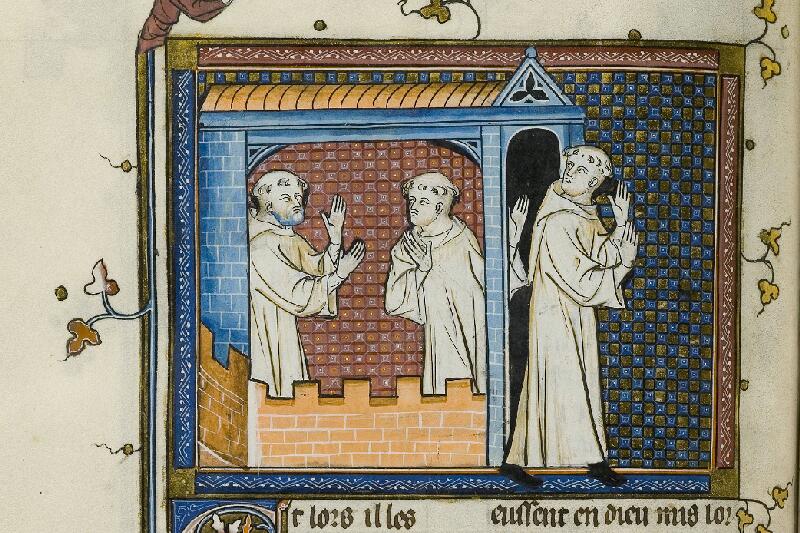
It is one of history’s gravest ironies that in a medieval world sanctioned by the modern observer with illiteracy, ignorance and obscurantism, the 10th-century grammar teacher Gunzo of Novara should be censured by his contemporaries for a Latin mistake he inadvertently made. To be sure, criticizing a 19th-century scholar for bad philology or a 21st-century scientist for a faulty application of the scientific method is one thing, but maligning an 10th-century intellectual for getting his Latin wrong is like giving Clio, the muse of history, an overdose of Prozac.
And yet, poor Gunzo had to enter history – and be stuck there – as the medieval grammarian who didn’t live up to his contemporaries’ high expectations. But what happened?
The little we know about Gunzo comes from the letter he wrote to defend himself against the libellous attack he sustained from the monks of the Abbey of St Gall in the Swiss Alps. Arriving at the abbey in the winter of 964, he let his grammar guard down and started chatting casually with the monks in the refectory. I imagine him over a nice cup of ale, not too pale to make him forget his Latin syntax, but stout enough to cause him to substitute an accusative for an ablative Latin word, which is actually what happened – the equivalent in Latin literate society of using ‘who’ instead of ‘whom’. He immediately realised that he was surrounded by purists for whom, he says in his letter, ‘to misplace a clause was a capital sin’. The jury decided and the judge ruled that Gunzo was guilty of lèse-majesté against language. The apologetic letter which followed was not so much apologetic as searing against St Gall, while affording, at the same time, an opportunity for Gunzo to let the monks of Reichenau, to whom the letter was addressed, know what a prodigious intellectual he was. In pitch-perfect oratorical style, Gunzo proudly explained that his error was not due to ignorance or carelessness, but to an excessive colloquial familiarity with Italian, which at that point was breaking away from Latin to become a language in its own right.

Mr. Cristian, may I ask about your roots? Although your article is well-written, I’m curious as to why you spelled “criticising” with an ‘s’ and “libellous” with three ‘l’s.
LikeLike
Hi there, many thanks for your question. As a matter of fact, I grew up in Romania and was educated in France. I have amended ‘criticizing’, but ‘libellous’ was spelled with two ll’s… I wonder why it should 3 l’s at your end… There are undoubtedly many more spelling errors throughout the blog as I endeavour to post a story every day, and sometimes time works against me… Thank you again!
LikeLike
Understandably, the more one performs an action, the more he or she is likely to make a mistake. My alluding to three l’s was the total number of l’s in the word. Your spelling though……I found to be more archaic and quirky than incorrect. Do you do a good deal of reading? It is possible that you picked up this rather odd spelling from prior reads.
LikeLike
Can you give me an example of quirky/archaic spelling? As far as I know, libellous is spelled libellous, and the word is not archaic in the slightest. Thanks
LikeLike
You’re kidding me, right? “Libellous” is spelled ‘libelous’…….just Google the word. As far as an example of quirky and archaic spelling, Google “Medieval Old English language” or open the link below:
https://www.google.com/search?q=Old+English+language&client=firefox-b-1-d&channel=tus2&sxsrf=ALeKk01AQzJq2P3gI29zz7Ree5uPD8gttg:1596381346921&tbm=isch&source=iu&ictx=1&fir=CQGRtGj3TaS85M%252ClfBycyN4rSZo3M%252C_&vet=1&usg=AI4_-kQ8qP14q1qgyDczJLezCituonKd5A&sa=X&ved=2ahUKEwjfr-_45_zqAhXCnOAKHUShCbsQ_h0wAHoECAcQBA&biw=1327&bih=746#imgrc=vlvxzex9Z1_FtM
LikeLike
This is getting silly, but here are my final points on the matter: libellous is spelled with two ll’s. You may want to check the OED and Cambridge Dic, not Google. Libelous is American spelling, by the way… Surely you know the difference.
Google, Quora… i happen to have a PhD in textual criticism, perhaps we should steer clear of Google and move onto more solid ground. And no, ‘I am not kidding you’, and because I don’t know you at all, I’ll give you the benefit of the doubt and suspend any suspicion relative to your tone.
LikeLike
And in the interest of clarity, i was asking for an example of ‘quirky’ or ‘archaic’ word ***I used***, not for an overview of the evolution of English
LikeLike
SIR, much respect. Let’s agree to disagree on the spelling. I’m not going to debate you on such a trivial matter. I think our disagreement may very well depend upon the nationality of the person using it. In Britain, they spell it with two l’s (on the end) and here in America, where I am, we spell it with one.
LikeLiked by 1 person
You are absolutely right, thank you! May I ask what your interest in language stems from?
LikeLike
A combination of school, teacher, and an insatiable interest on my part.
LikeLike